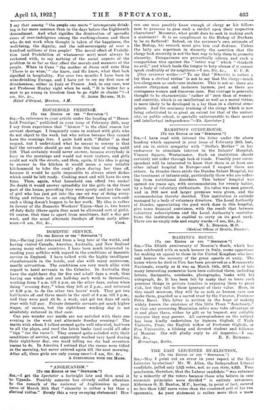"ANGLICANISM."
[To um EDITOR or THE " Seterseoa."]
;Sra,—I get the Spectator a fortnight late and then send it to Uganda. Possibly someone has already called attention to the remark of the reviewer of Anglicanism in your issue of March 25th that " sincerity is rather a lay than a ,eieriord virtue." Surely this a very sweeping statement! How can one man possibly know enough of clergy or his fellow- men to presume to pass such a verdict upon their respective characters? Moreover, what profit does he seek in making such a statement? It is no compliment to the Bishop of Durham to be so flattered! Indeed, on the reviewer's own estimate of the Bishop, his remark must give him real distress. Unless the laity are supermen in sincerity the assertion that the clergy lack sincerity is not the best way to help them to promote sincerity. Comparisons are proverbially odious, and such a comparision sins against the " better way " which " thinketh no evil," and which leads the tongue to keep silence if it cannot speak creditably of its neighbour.—I am, Sir, &c., C. F. B.
[Our reviewer writes To say that ` Sincerity is rather a lay than a clerical virtue' is not to say that the clergy—much less clergymen as such—are insincere. This is not so : there are sincere clergymen and insincere laymen, just as there are courageous women and timorous men. But courage is generally thought to be characteristic ' rather of ' men than of women : and sincerity, which is an intellectual as well as a moral virtue, is more likely to be developed in a lay than in a clerical atmo- sphere. And the seminary training of the clergy which is now being substituted to so great an extent for that of the univer- sity, or public school, is specially unfavourable to their moral and intellectual independence."—ED. Spectator.]


































 Previous page
Previous page